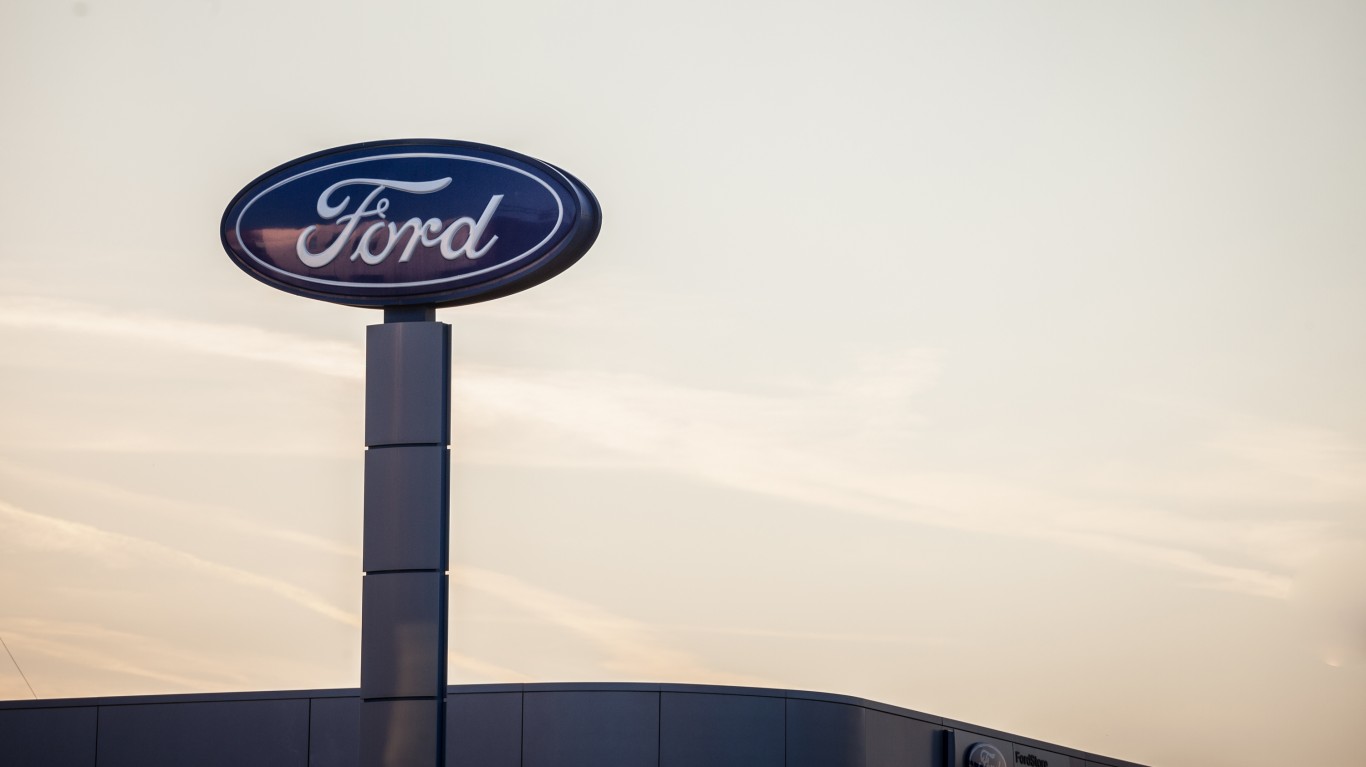Cars and Drivers
Why Execs Emphasize an Electric Future for Ford Stock

Published:
Last Updated:

If you consider Ford Motor Co. (NYSE: F) a long-term investment, it’s worth looking beyond the coronavirus pandemic toward the company’s future plans. In its recent first-quarter earnings call, Ford reiterated its commitment to a “fresh new portfolio of vehicles” focusing on the environment, fuel costs and connectivity.
Ford stock closed up 7.6% Friday at $5.24, but it’s down nearly 44% year to date, with a 52-week range of $3.96 to $10.56. Since 2015, Ford stock has lagged behind the S&P 500.
The move towards electrics remains a big push for Dearborn, Michigan-based Ford, even for its best-selling vehicle. The desire to be greener could move some consumers to trade in their older vehicles, even if they’re still running well.
While the first generation of electric and hybrid cars were typically small, American automakers are betting on a new generation of full-size vehicles. Ford recently confirmed that its relaunched F-150 pickup truck will include, for the first time, fully electric and hybrid models. Originally scheduled for a spring 2020 launch, the new F-150s are now expected in the fall or early next year. If Ford can sell electric F-150s, it may mark a turning point in Americans’ acceptance of e-friendly vehicles.
Ford also has high expectations for the Mustang Mach-E, an all-electric SUV. It’s expected to be available later this year or early in 2021, depending on the model. The sleek vehicle aims to challenge Tesla in the sedan market, and may be just the ticket for parents who still have a little muscle-car nostalgia. Design elements clearly tie the Mach-E to the Mustang family.
A $7,500 federal tax credit should also make the Mach-E more attractive to buyers. The credit is available for the first 200,000 plug-in electric vehicles sold by a manufacturer.
But some e-vehicle plans aren’t going forward. Ford recently canceled plans to make an electric Lincoln with Rivian, the electric car startup backed by Ford and Amazon.com Inc. (NASDAQ: AMZN).
Ford said it remains committed to Rivian and expects to do an electric Lincoln model at some point. Rivian continues work on electric delivery vans for Amazon.
The electric/hybrid push isn’t limited to the U.S. market. “We’re going to continue our launch of 30 market-specific Ford and Lincoln vehicles in China over the next 3 years, 10 of which will be electric,” said Chief Operating Officer Jim Farley in a recent call with analysts.
While North American plants remain closed, Ford is seeing activity elsewhere, including China, where all its plants are operational again.
Reuters reports that Ford’s 50-50 joint venture with Chongqing Changan Automobile Co. sold 20,465 vehicles in April, up 38.3% from the same period last year. And Ford owns a stake in Jiangling Motors Corp., which sold 28,028 vehicles last month, up 7.8%.
The positive April numbers follow a dismal first quarter, when sales vanished as the Chinese economy came to a standstill.
Following China, Ford plants in Europe reopened last week, with elaborate safety protocols designed to protect plant workers. Ford devised a novel way of providing face masks and shields to workers without cutting into the public supply: it’s manufacturing its own. The protective equipment is being produced at Ford facilities in Germany, Romania, Spain and the U.K. And vehicles are already rolling off assembly lines after a seven-week hiatus.
Lessons learned in China and Europe will be forwarded as North America preps to reopen. Closed since March 14, Ford plans to restart its North American plants May 18. Ford joins Fiat Chrysler Automobiles (NYSE: FCAU) and General Motors (NYSE: GM) in setting May 18 as the date to restart vehicle production.
“We have reopened our facilities in China, successfully begun our phased restart in Europe and have been producing medical equipment in Michigan for more than six weeks and are using the lessons from all of that to ensure we are taking the right precautions to help keep our workforce here safe,” Farley said.
As assembly lines power up, Ford execs are wondering if the pandemic lockdown might have permanently changed some consumer behavior in ways that will benefit the bottom line. “About 1/3 of our sales are now online in North America, it’s north of 25%,” Farley said. “That’s an efficiency and improvement in our fitness. We did lower cost.”
If there’s any upside to the coronavirus crisis, companies will gladly take it.
The average American spends $17,274 on debit cards a year, and it’s a HUGE mistake. First, debit cards don’t have the same fraud protections as credit cards. Once your money is gone, it’s gone. But more importantly you can actually get something back from this spending every time you swipe.
Issuers are handing out wild bonuses right now. With some you can earn up to 5% back on every purchase. That’s like getting a 5% discount on everything you buy!
Our top pick is kind of hard to imagine. Not only does it pay up to 5% back, it also includes a $200 cash back reward in the first six months, a 0% intro APR, and…. $0 annual fee. It’s quite literally free money for any one that uses a card regularly. Click here to learn more!
Flywheel Publishing has partnered with CardRatings to provide coverage of credit card products. Flywheel Publishing and CardRatings may receive a commission from card issuers.
Thank you for reading! Have some feedback for us?
Contact the 24/7 Wall St. editorial team.